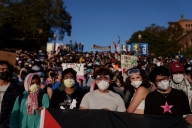You have /5 articles left.
Sign up for a free account or log in.
Columbia University has reached a $12.5 million settlement with students who sued the school for failing to refund fees when it pivoted to online classes in the spring of 2020.
As the COVID-19 pandemic spread across the U.S., Columbia—like most U.S. colleges and universities—shifted to remote learning in an effort to keep infection rates low. A class action complaint brought against the university in April 2020 sought reimbursement for both tuition and fees for the spring semester, though the request to reimburse tuition was dismissed by a judge in February.
According to the preliminary settlement, filed Tuesday night, $8.56 million will go toward refunding fees paid for student activities, university health services and the use of Columbia gyms, libraries and other campus facilities, Reuters reported. The remaining $4 million will be paid out to “avoid the risks of further litigation,” according to Reuters, which also reported that the preliminary settlement needs judicial approval to become official.
Court documents note that “Columbia has continued to deny all allegations of wrongdoing” but that “Columbia considers it desirable to resolve the Action on the terms and conditions stated herein to avoid further expense, inconvenience, and burden, and therefore has determined that the Settlement on the terms and conditions set forth herein is in Columbia’s best interests.”
“The pandemic has imposed serious challenges on sustaining the teaching, research, patient care and public service at the core of Columbia's mission,” the university wrote in a statement to Inside Higher Ed. “Throughout this period, we have been committed to meeting the needs of our students. The proposed settlement filed with the court will provide additional support to students who attended the University during the spring semester of 2020.”
According to one litigation tracker, there have been at least 261 lawsuits filed nationwide seeking reimbursement of tuition and fees prompted by issues related to COVID-19.







